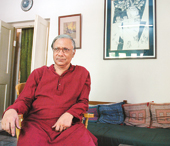 |
| Professor Sukanta Chaudhuri, who retired on June 30, at his Salt Lake home. Picture by Sanat Kr Sinha |
Calcutta has an illustrious tradition of excellence in the teaching of English Literature. And the name of Sukanta Chaudhuri, who retired on June 30 as professor of English at Jadavpur University, is certainly a vital part of the Eng Lit lore of this city.
Chaudhuri, internationally acclaimed for his contribution to Renaissance Studies, is a prolific writer, translator and lecturer with wide-ranging interests. From urban planning to educational policies, textual criticism to translation of Tagore, his intellectual legacy is as various as it is formidable.
Yet, it is mostly as a teacher that Chaudhuri will be missed by future generations of students. As his students will agree, Sukantada was one of the most dynamic and inspiring presences at Jadavpur University, which he joined in 1991 after a long tenure at Presidency College.
His lectures on King Lear, Metaphysical Poetry and the European Renaissance, which I attended as a postgraduate student, were events in themselves. Sukantada had the gift of putting his erudition in a familiar human context — even an analysis of the knotty textual history of Lear opened new windows on a world of feelings.
Sukantada always struck a fine balance between ideas and emotions. For him, a thorough knowledge of the text was of absolute importance, there were no shortcuts to excellence. Those of us who had him as tutor will remember his extensive, often incisive, marginal comments on our essays.
And yet, he was open to discussions, ever willing to listen to our half-baked theories, and ready to help us out with books. Some of us were probably intimidated by the high seriousness he brought to his lectures, but for those committed to in-depth learning, Sukantada’s intense absorption in the subject was like a beacon of light. If you were inclined towards research, you could get no better inspiration than by attending Sukantada’s classes.
Sukantada’s enthusiasm for hard work was infectious. As the director of the School of Cultural Texts and Records, he had a devoted team working on various projects. He was actively involved in designing the semester system that replaced the older, more impersonal, programme under which students never got a proper chance to pursue their individual interests. Although he sees a lot of merit in the new system, Chaudhuri admits the danger of students focusing too closely on a few areas at the expense of the larger picture.
He is glad that the study of English Literature now includes texts from all over the English-speaking world (even literature in non-Indian or vernacular languages). At the same time, he is put off by the superficial way in which this valuable “comparitivist” aim is undertaken in practice.
“Especially with Indian material, students should branch out in a committed manner by engaging with the original languages and contexts, instead of toying with a handful of English translations,” he insists. But that involves transforming the English departments into general departments of literature.
Chaudhuri believes that these problems are compounded by a failure to distinguish between the teaching of English as a practical linguistic tool, and the study of literature, thought and culture as a humane discipline. The latter is being diluted where it is not totally banished. The importance of the humanities in fundamental research is thus being seriously undermined.
Even more fundamentally, Chaudhuri is worried about the state of basic education in India. As the chairman of The Telegraph Education Foundation, he is involved in raising awareness about the dismal conditions under which most children do or do not get a chance to study in this country. He is keen that the empowered sections of society look beyond the education of their own children and take stock of the ground realities instead.
With more time on his hands now, Chaudhuri hopes to further this enterprise, apart from carrying on with his own research and writing.
What made Chaudhuri your favourite teacher? Tell ttmetro@abpmail.com










